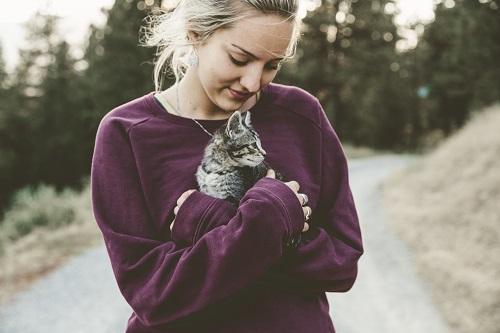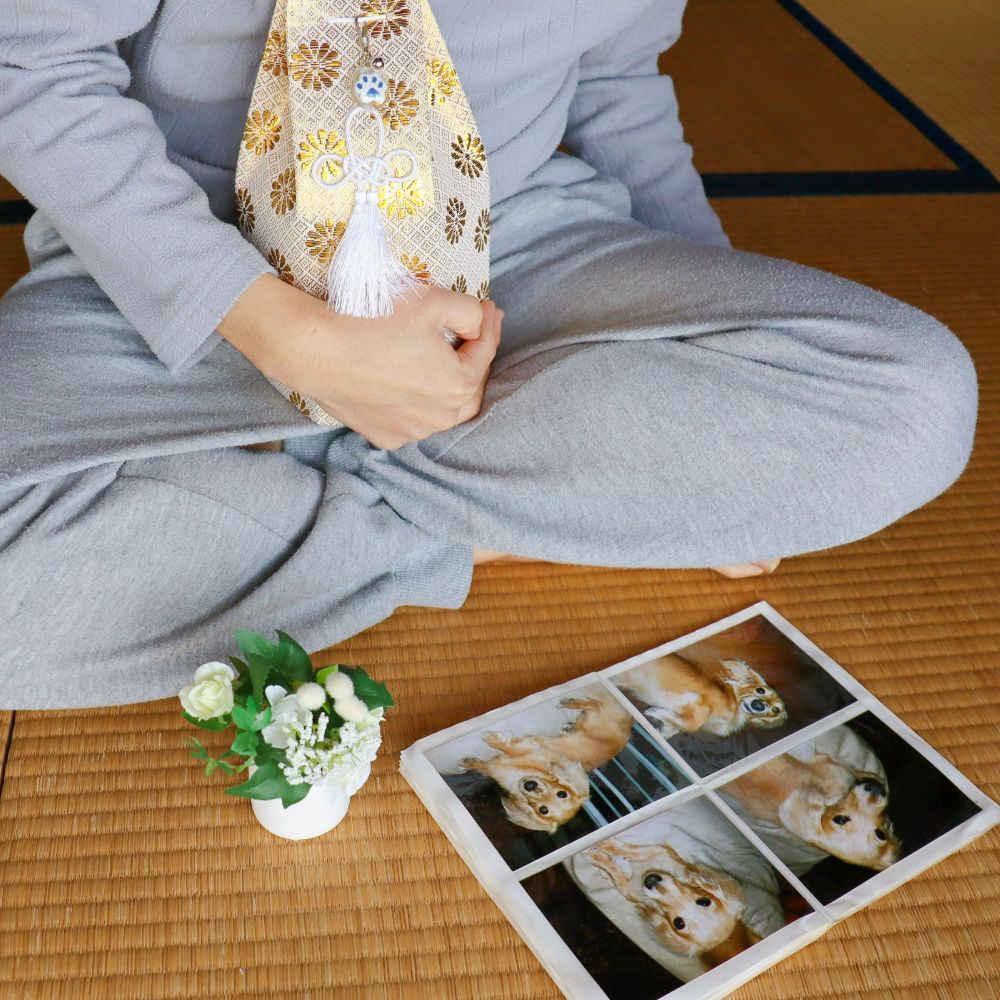All Articles & Guides / Pet Loss / Dealing With the Loss of a Pet
Dealing With Loss of a Pet Grief
For many people, the loss of a pet can be a devastating blow. We often think of our pets as part of the family, giving us unconditional love and trusted companionship. When this family member dies, it can leave us feeling deeply sad, guilty, or angry. Learning how to deal with the loss of a pet can take time since losing a pet can leave a significant void or emptiness in our lives.
How to Grieve the Loss of a Pet
Many people consider their pets to be part of the family, so it’s completely natural to grieve after the loss of a dog, cat, or another companion animal. Your pet provided you with unconditional love, emotional support, companionship, and more. Often, we miss not only the pet itself but also the loss of the additional benefits of this special relationship.
Different people respond different ways, so there is no timeline to grief. It can often take months and there isn’t a specific sequence of steps on how to grieve the loss of a pet. Perhaps the most vital step in coping with the emotions you will feel upon the loss of your pet is acknowledging them. “Let yourself feel – write down your feelings, cry, be angry, call someone. Know that it is all right to be so upset over losing your pet and that it takes time to heal,” wrote Susan K. of New York.
To deny and/or repress that sense of loss would be to devalue the love and affection that the pet brought into your life,” said Pat H. of Pennsylvania.
While not everyone’s grief is expressed in the same way, there are some common reactions to the dealing with the loss of a pet and letting yourself feel emotions is often an important part of accepting your loss.

The Emotions of Pet Loss
Denying that you’re sad or angry rarely makes those feelings go away; it just makes them linger and often makes you feel even worse, since you feel bad for feeling those emotions at all. The healthiest response to dealing with the loss of a pet is to let yourself feel any emotions that you experience, and to try to focus on accepting your loss and moving on.
There is no set timetable for how to mourn the loss of a pet but letting yourself focus obsessively on the sadness and loss can make it harder to move past. “My personal experience was an intense grieving process that left me emotionally devastated for several weeks,” wrote Roanne H. of New Jersey. “I am still surprised by the ongoing feelings of love for the departed pet that I am experiencing. The length of time it takes to begin accepting the loss of your pet will vary.”
Most pet owners experience guilt and regret after the death of a pet. We are ultimately responsible for what happens to our pets, so when they die by any cause, guilt is a very natural response. They counted on us to care for them, and we feel like we’ve failed. This emotion is amplified if we were directly connected to the cause of death in some way, whether by accidentally feeding the dog a dangerous food or deciding to euthanize the cat due to illness.
The following quotes from our customers explained the emotions they experienced when grieving the loss of a treasured pet.
“It was the most tragic, traumatic, and emotionally devastating experience I had ever been through. I didn’t know what to do. I cried day and night.” (Dorothy R., Alabama)
“I felt like someone had ripped out my insides.” (Karen A., Illinois)
“I never knew anything could hurt so bad. I cried a whole ocean of tears. I went through self-hatred for putting my pet to sleep, to depression, to acceptance. For a long time, I couldn’t even watch a dog food commercial.” (Cheryl T., Alabama)
Like guilt, the loss of a pet can trigger anger in many people. You may be angry at the veterinarian for not doing something that could have saved your pet, angry at a careless driver or thoughtless neighbor who caused the pet’s death, or angry at yourself for not doing enough to prevent the death. Some people also get angry at the pet itself for dying, or at the illness or injury for causing so much pain. You can choose how to deal with sudden pet loss, but anger will often only be a step during the grieving process.
Mourning the Loss of a Pet
The first step is coming to terms with our emotional wounds after our pet dies and addressing our needs. Expressing your sadness while mourning the loss of a pet is natural, and it may help to seek condolences from friends and family. You may even consider having a funeral for your pet, or memorial service. However, keep in mind that many people have simply never had a close relationship with an animal of any kind. Perhaps their parents never allowed them to have pets as children, so they grew up without knowing how much animals can mean in our lives. Different people live different lives; be aware of the differences between your experiences and those of people who seem insensitive to your loss. If your friends or family members have never experienced that relationship, it doesn’t mean that they don’t care about you, they simply might not even be aware of the deep bond a human can have with an animal. If you can, seek out people who have had similar relationships with pets – but remember, even other pet lovers may not be experts at dealing with the emotional needs of other humans!
“The problem is that our culture is extremely intolerant of grief,” writes animal behaviorist C. Miriam Yarden. “From childhood we are taught that crying is a show of weakness – and in the case of boys and men this attitude is even more rigid. We often do not allow our children to mourn or feel a loss, let alone show it. Most often it is such owners who espouse the attitude of hard determination to never get another pet because ‘I can’t go through this again.’ Of course, they can’t go through this ‘again,’ considering that they haven’t gone through ‘this’ in the first place! It is also they who suffer the most.” Yarden passed in 2017, but her life experience and devotion to animals allowed her to pass on her knowledge of animal behavior for over 40 years.
One way that some people find helps with how to deal with the loss of a pet, is burying your beloved animal at home. Many people choose to bury a pet at home as a way of keeping it close — a part of one’s world, even if it isn’t a part of one’s life. This can also provide a way for you and your family to celebrate a funeral and memorial service, which in themselves can be powerful coping tools. Some pet owners have also reported that their surviving pets seem to understand that their companion is still “present”, and report that those pets may spend time visiting the gravesite. Home burial provides the opportunity to create a permanent memorial to one’s pet — a grave marker, a statue, or perhaps a tree planted over the pet’s grave to serve as a living memorial. Others choose to bury a pet under an existing shrub or tree that the pet liked to sleep under. Either way, creating the perfect pet memorial space can help guide the grieving process of how to mourn the loss of pet. The act of selecting pet caskets, markers, and commemorative memorial items can also help with acceptance.
If you would still like to keep your pet’s remains on your property, but don’t have a place to bury the actual remains (especially that of a large pet), consider having your pet’s remains cremated and returned to you for burial. This still has the advantage of keeping your pet “at home,” but bypasses health problems or the concern that the pet’s remains might be disturbed later. Or, you can keep the pet’s ashes in a commemorative or personalized pet urn in your home.

How to Get Over the Loss of a Pet – Is it too soon for a new pet?
Some people find that getting a new pet soon after the loss of a companion animal helps with the healing process. It allows them to focus on the positive emotions of the new companion rather than dwelling on the loss. It’s best to give yourself time, however, and not to make any abrupt decisions. Pets have their own personalities, and you shouldn’t expect a new pet to replace a previous one.
Once you give yourself the time that you need to grieve, you may feel ready for a new pet. Most people know when they are ready, and you should trust your instincts. Losing a pet disrupts your daily routine, so try to consider whether you are also in the right situation to be adding a pet to your family or whether you’re merely looking for a way to get over the loss.
If you think that you aren’t ready, or that you may never be ready for a new pet, that’s okay, too. Some people fear losing another companion or feel like getting a new pet is somehow disloyal. Give yourself time and don’t make any decisions until you’re ready. You may find that, after a period of mourning, you’re ready to share your heart and your home again with a new companion.
Another method some turn to when wondering how to get over the loss of a pet is by memorializing them. Pet cremation jewelry is a wonderful way to keep your pet close to your heart. Having a personalized token that you can wear daily can be restorative and help provide comfort during the grieving process.
If you buried your pet at home, a personalized pet marker or plaque can be placed in their burial spot, or even mounted to a tree, or kept inside next to their urn. Having a location to visit can also help accept and get over the loss of a pet since you’re able to grieve or commiserate in a safe space.
Choosing how to deal with the loss of a pet is the first step in your healing process. There is no shame in expressing your sadness, and we hope that our guide provides some reassurance and inspiration on how to mourn the loss of a pet, but also how to memorialize and cherish the time you had with your beloved furry family member.
Related Content





